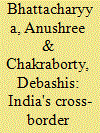| Srl | Item |
| 1 |
ID:
105699


|
|
|
|
|
| Publication |
2011.
|
| Summary/Abstract |
In the last decade, infrastructure development initiatives across borders, both in South and Southeast Asia, have emerged as a major tool of economic diplomacy, practiced both by China and India. Indeed, it was China's successful experience of linking with the neighbourhood that motivated India to try to extend influence as well as trade beyond its borders. India's success at developing cross-border connectivity is still quite modest compared to China's achievements, but in the long term, India's connectivity drive in its immediate and extended neighbourhood should contribute significantly to supporting its economic growth and providing a counterbalance to Chinese influence in the region.
|
|
|
|
|
|
|
|
|
|
|
|
|
|
|
|
| 2 |
ID:
181537


|
|
|
|
|
| Summary/Abstract |
Divided societies have long been seen as terrible terrain for democracy. Yet some countries in South and Southeast Asia have managed to overcome ethnic and religious rifts and establish lasting democracy, as in India, while other countries in these regions have seen such deep divisions underpin durable authoritarianism, as in Malaysia. We trace these differences to divergent definitions of the nation that prevailed in struggles for independence and that continue to provide a political resource in ongoing political struggles. Where the national community was defined as inclusive in both ethnoreligious and popular terms, democracy has proven stronger. Alternatively, where the foundational national bargain was more exclusive with respect to salient identity cleavages and popular classes, authoritarianism has been reinforced. Founding types of nationalism not only help explain regime types in India and Malaysia but in countries across southern Asia, offering novel insight into how to understand ongoing battles to shape the nation and the people’s political position within it. In an era of rising nationalist fervor and eroding support for democracy, understanding the conditions under which nationalism either promotes democracy or bolsters authoritarianism is of critical importance to political scientists, activists, and policymakers alike.
|
|
|
|
|
|
|
|
|
|
|
|
|
|
|
|